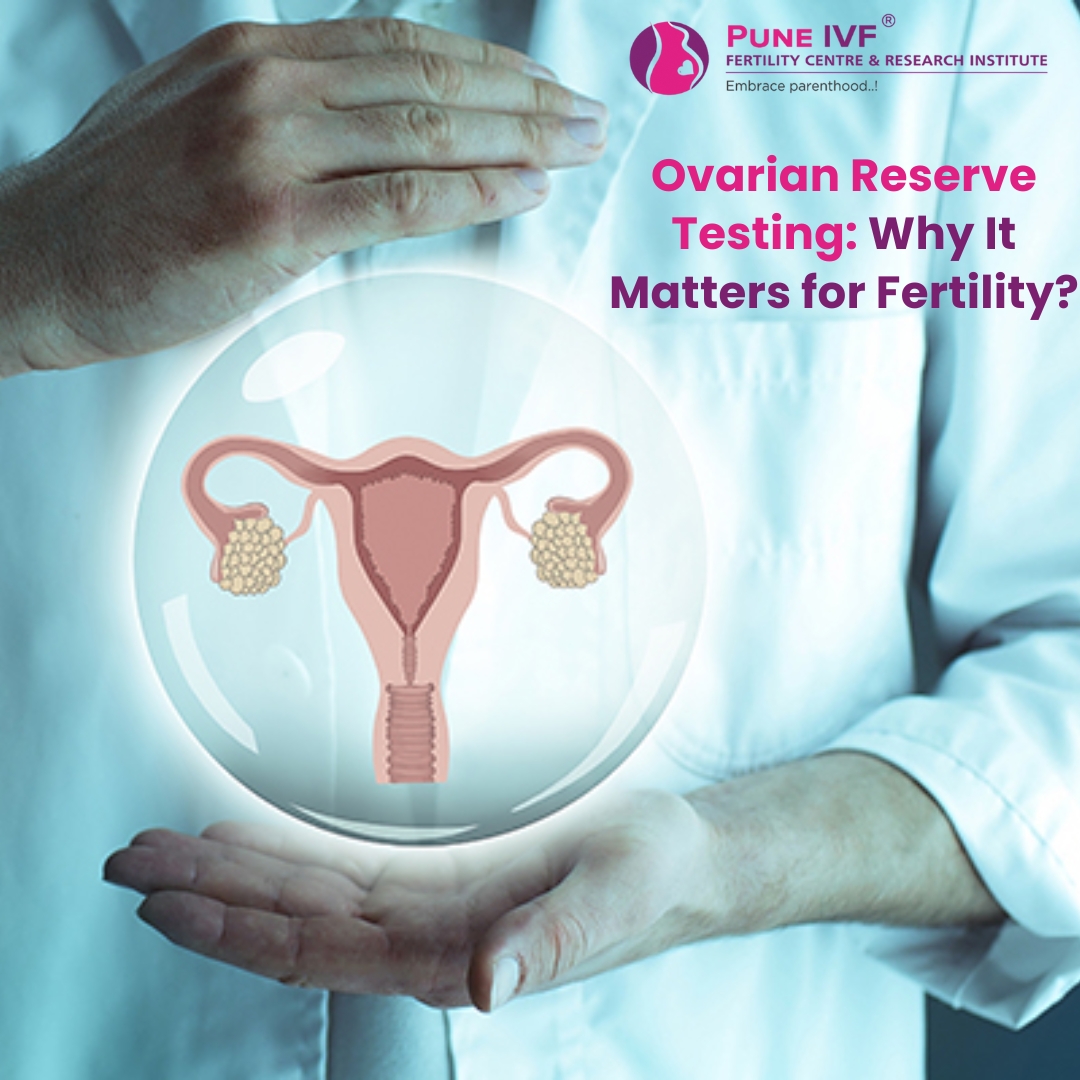Ovarian Reserve Testing: Why It Matters for Fertility?
– Published on 25 APRIL 2024

Understanding Ovarian Reserve and Its Role in Fertility
Every woman is born with a finite number of eggs in her ovaries. As age increases, this egg count naturally declines — both in quantity and quality. The term “ovarian reserve” refers to the number and health of eggs a woman currently has, which plays a critical role in her fertility potential.
At Pune IVF, we emphasize the importance of understanding your ovarian reserve, as it provides valuable insight into your reproductive health and helps plan personalized fertility treatments effectively.
What Is Ovarian Reserve Testing?
Ovarian reserve testing is a set of simple blood tests and ultrasound evaluations that help assess how many eggs are available in a woman’s ovaries. It helps fertility specialists predict how well a woman might respond to fertility treatments such as IVF (In Vitro Fertilization) or IUI (Intrauterine Insemination).
This testing is especially useful for women who:
- Are above 30 and planning pregnancy.
- Have been trying to conceive for more than a year without success.
- Have irregular menstrual cycles.
- Have undergone chemotherapy, radiation, or ovarian surgery.
- Have a family history of early menopause.
- Want to delay pregnancy and preserve fertility through egg freezing.
By understanding your ovarian reserve, our fertility specialists at Pune IVF can guide you on the best treatment approach suited to your unique reproductive profile.
Types of Ovarian Reserve Tests
There are several ways to assess ovarian reserve. At Pune IVF, our fertility experts use a combination of tests to ensure the most accurate results:
- Anti-Müllerian Hormone (AMH) Test
AMH is a hormone secreted by the small follicles in the ovaries. The AMH level gives a direct indication of the number of remaining eggs.
- High AMH levels indicate a good egg reserve.
- Low AMH levels suggest a reduced ovarian reserve.
Since AMH levels remain relatively stable throughout the menstrual cycle, this test can be done at any time of the month.
- Antral Follicle Count (AFC)
This test is done through a transvaginal ultrasound. The doctor counts the small follicles (2–10 mm) present in both ovaries during the early phase of the menstrual cycle.
- A higher AFC indicates a better ovarian reserve.
- A low count may suggest a lower chance of success with fertility treatments.
- Follicle-Stimulating Hormone (FSH) Test
FSH is a hormone responsible for stimulating egg growth in the ovaries. The test is usually performed on the 2nd or 3rd day of the menstrual cycle.
- High FSH levels may indicate that the ovaries are not responding well, suggesting a diminished reserve.
- Estradiol (E2) Test
Estradiol, a type of estrogen, is tested along with FSH. High E2 levels on day 3 can indicate early ovarian aging or poor egg quality.
IWhy Ovarian Reserve Testing Matters
Ovarian reserve testing is more than just a number—it offers a comprehensive understanding of a woman’s fertility health. Here’s why it’s essential:
- Early Awareness of Fertility Status
Knowing your ovarian reserve allows women to make informed decisions about their reproductive future, especially if they plan to delay pregnancy. - Helps Personalize Fertility Treatment
At Pune IVF, we use ovarian reserve results to design customized treatment plans. For example, women with lower reserves may benefit from specific stimulation protocols or advanced procedures like ICSI (Intracytoplasmic Sperm Injection). - Predicts IVF Success Rates
The test results help predict how a woman might respond to ovarian stimulation during IVF, giving an idea about the expected number of eggs retrieved. - Guides Egg Freezing Decisions
For women who want to postpone motherhood for personal or medical reasons, ovarian reserve testing helps determine the right time for egg freezing. - Identifies Risk of Ovarian Hyperstimulation
In women with high ovarian reserve (such as those with PCOS), the test helps avoid overstimulation during fertility treatment.
Supports Early Intervention
Detecting low ovarian reserve early allows timely medical intervention, maximizing the chances of achieving pregnancy through assisted reproductive techniques
Ovarian Reserve Testing at Pune IVF
At Pune IVF, we believe knowledge is power when it comes to reproductive health. Our fertility experts offer accurate ovarian reserve testing with state-of-the-art diagnostic tools and compassionate care.
Here’s what makes us a trusted choice for fertility care in Pune and PCMC:
- Advanced fertility diagnostics with modern ultrasound and hormone testing facilities.
- Customized treatment plans based on your test results and reproductive goals.
- Expert fertility specialists with years of experience in IVF, ICSI, and egg freezing.
- Comprehensive counseling and support throughout your fertility journey.
Take the First Step Toward Parenthood
If you’re planning to start a family or want to understand your fertility better, ovarian reserve testing can provide the clarity you need.
At Pune IVF, we help you make informed choices and guide you toward the best path for achieving your dream of parenthood.
Schedule your ovarian reserve test today at Pune IVF and take the first step toward understanding your fertility health.

By Dr Samidha Dalvi-Amale
IVF and Fertility specialist Medical Director- Pune IVF
